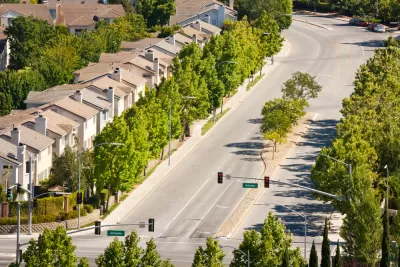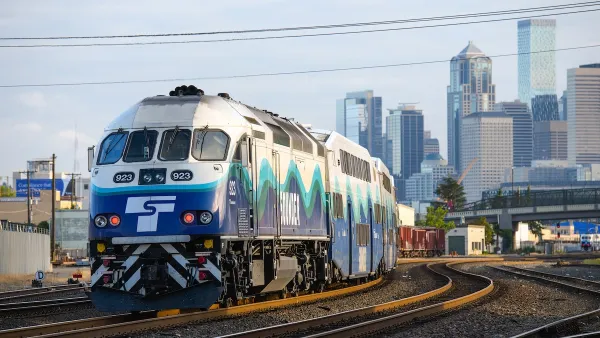One researcher argues that the division between transportation and land use policymaking at the federal level has harmed communities of color and encouraged unchecked sprawl.

Despite how deeply intertwined the issues of land use and transportation are, writes Yonah Freemark in Urban Wire, the two remain, administratively, "divided at the federal level." Freemark argues that "better planning and collaboration across the federal government could improve how communities are built and ensure their residents have access to more equitable outcomes."
Freemark's research "investigates in detail the major public debate about how to manage federal policy in transportation and land-use planning that occurred in the 1960s," when "there was neither a HUD nor DOT." At that time, "[h]ousing and land-use planning policy were run out of the Housing and Home Finance Agency (HHFA), and transportation policy was mostly run out of the US Department of Commerce."
After the creation of the Department of Housing and Urban Development (HUD) in 1965, the agency was tasked with managing "housing, land use, and transit planning" as well as "policy determination over highways in urban areas." This approach, argues Freemark, was undermined by the creation of the Department of Transportation (DOT) the following year, which "encouraged some congressmembers to think of transportation as independent, not integrated into the urban system." As a consequence of this and some congressmembers' disapproval of HUD's emphasis on the needs of Black residents, "in 1968, Congress moved all transportation planning to DOT, where it has remained since, isolated from housing and land-use planning."
Since the 1970s, Freemark writes, the "failure of federal administrators to plan for transportation and land use in parallel" has led to unchecked sprawl and a loss of access to public services for communities of color. Pointing to successful examples from other countries, he argues that "coordinating federal programs could improve US communities’ ability to plan for a less automobile dependent, more equitable future."

Maui's Vacation Rental Debate Turns Ugly
Verbal attacks, misinformation campaigns and fistfights plague a high-stakes debate to convert thousands of vacation rentals into long-term housing.

Planetizen Federal Action Tracker
A weekly monitor of how Trump’s orders and actions are impacting planners and planning in America.

In Urban Planning, AI Prompting Could be the New Design Thinking
Creativity has long been key to great urban design. What if we see AI as our new creative partner?

King County Supportive Housing Program Offers Hope for Unhoused Residents
The county is taking a ‘Housing First’ approach that prioritizes getting people into housing, then offering wraparound supportive services.

Researchers Use AI to Get Clearer Picture of US Housing
Analysts are using artificial intelligence to supercharge their research by allowing them to comb through data faster. Though these AI tools can be error prone, they save time and housing researchers are optimistic about the future.

Making Shared Micromobility More Inclusive
Cities and shared mobility system operators can do more to include people with disabilities in planning and operations, per a new report.
Urban Design for Planners 1: Software Tools
This six-course series explores essential urban design concepts using open source software and equips planners with the tools they need to participate fully in the urban design process.
Planning for Universal Design
Learn the tools for implementing Universal Design in planning regulations.
planning NEXT
Appalachian Highlands Housing Partners
Mpact (founded as Rail~Volution)
City of Camden Redevelopment Agency
City of Astoria
City of Portland
City of Laramie





























